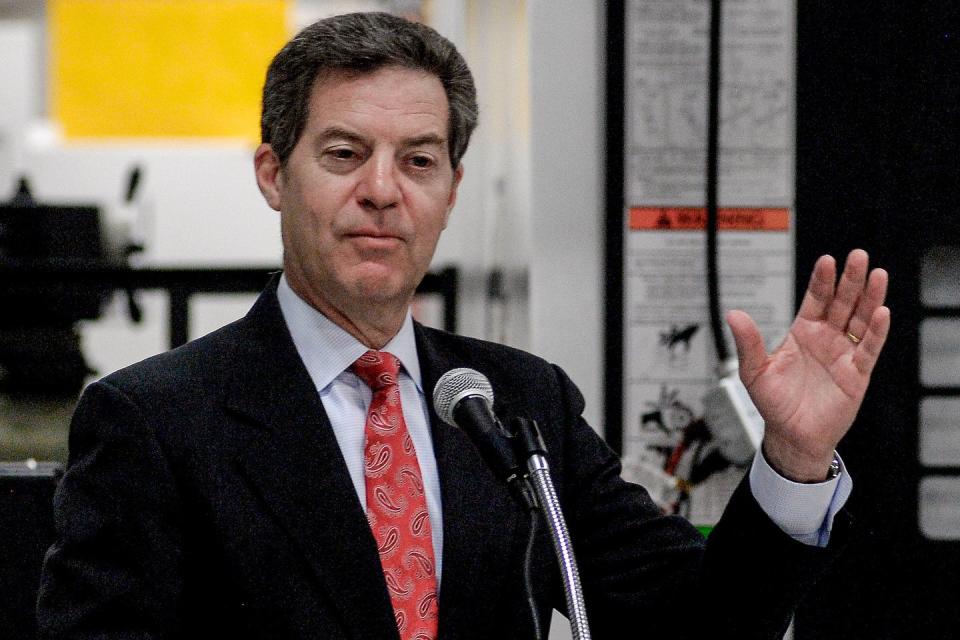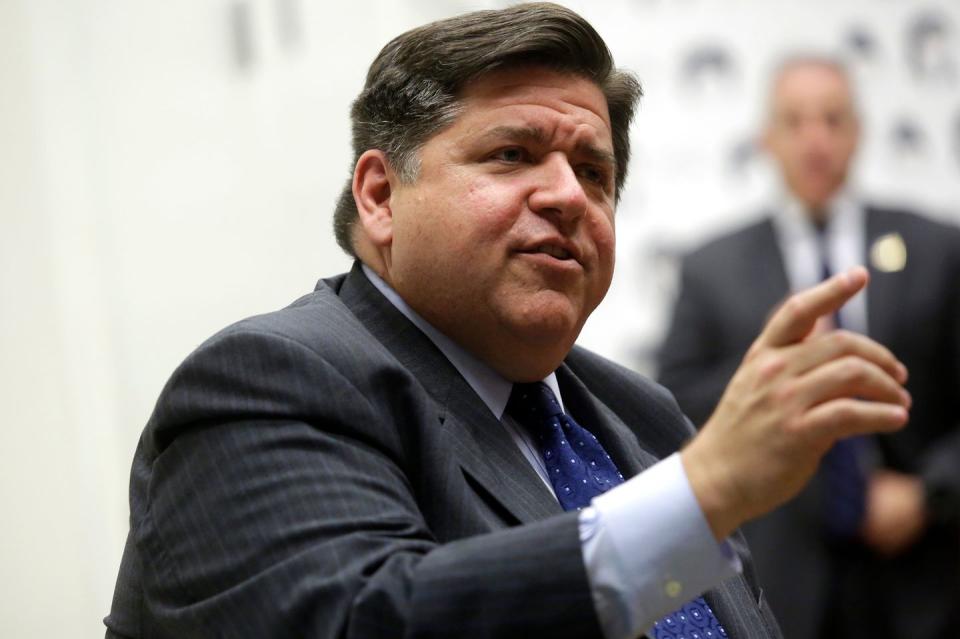Kansas Is the Latest Stop in the Republican Quest to Root Out Inconvenient Democracy

(Permanent Musical Accompaniment To This Post)
Being our semi-regular weekly survey of what's goin' down in the several states where, as you know, the real work of governmentin' gets done, and where the highway is for gamblers, so use your sense.
One of the really wicked, tricksy, false plays being run in various state governments these days is the ongoing effort by Republican legislative majorities to neuter Democratic governors whose election last fall these legislative majorities consider to be inconvenient. Wisconsin has been the index patient in this regard, but don't sleep on Kansas. There may not be much nostalgia for former Governor Sam Brownback, who turned the state government into Ayn Rand's lab rat, but the Republicans in the Kansas state capitol aren't taking the election of Democratic Governor Laura Kelly last November lying down, either. From the Wichita Eagle:
Under the state Constitution, the governor holds the power to appoint a replacement if the office of the attorney general or secretary of state becomes vacant. HCR 5013, however, would allow the legislature to move that power to party delegates. The system would work much in the same way legislative vacancies are filled now, Rep. Blake Carpenter, R-Derby, said. “More or less we’re just modeling the appointment process after how we appoint legislators,” Carpenter said.
Sure, nothing to see here. Move along, please.
The appointment power would fall to the delegates of whichever party last held the executive office. For example, if Attorney General Derek Schmidt, a Republican, were to leave, it would be up to to the Republican party to choose a replacement. It “allows both parties to have a fair shake,” Carpenter said.
Bullpucky. It would allow Brownbackian Kansas Republicans to maintain a lock on state offices after the people rose up in rebellion against the way Brownback ran things. In addition:
A second bill, HB 2410, would remove the governor’s power to fill vacancies in the offices of the state treasurer and insurance commissioner. The bill was requested for introduction on March 25, also by Carpenter.
Ni shagu nazad, baby. Not one step backwards, and they never sleep on power.

In a similar vein, Florida is monkeywrenching a referendum that passed by a huge margin in November giving convicted felons who'd served their bids their right to vote. Now, in 1966, the Supreme Court, by a 6-3 margin, decided the case of Harper v. Virginia Board of Elections, a ruling that declared unconstitutional forever the idea of a poll tax. Writing for the majority, Justice William O. Douglas said:
We say the same whether the citizen, otherwise qualified to vote, has $1.50 in his pocket or nothing at all, pays the fee or fails to pay it. The principle that denies the State the right to dilute a citizen's vote on account of his economic status or other such factors, by analogy, bars a system which excludes those unable to pay a fee to vote or who fail to pay.
It is argued that a State may exact fees from citizens for many different kinds of licenses; that, if it can demand from all an equal fee for a driver's license, it can demand from all an equal poll tax for voting. But we must remember that the interest of the State, when it comes to voting, is limited to the power to fix qualifications. Wealth, like race, creed, or color, is not germane to one's ability to participate intelligently in the electoral process. Lines drawn on the basis of wealth or property, like those of race (Korematsu v. United States, 323 U.S. 214, 216), are traditionally disfavored.
Poll taxes had been steadily transforming into a universally acknowledged abomination. (Four years earlier, their elimination had been the topic of a maiden speech from a newly elected senator from Massachusetts named Edward M. Kennedy.) So, when the Court finally ruled, it was to place what was believed to be a permanent set of shackles on this particular enemy of the franchise.

Ah, but the forces that benefitted from poll taxes, and from all other manner of voter suppression, were not entirely in irons. And now, in 2019, they are loose again in Florida. From WWSB:
Republican Rep. Jamie Grant of Tampa, the main sponsor, said completion of a sentence includes any period of probation and any financial obligations ordered by a judge. Grant said proponents of Amendment 4 specifically included those provisions when the issue came before the Florida Supreme Court for approval prior to last year's election."We're not putting any additional impediments in. We are upholding what was put before the voters," Grant said. "It absolutely includes fines, fees and court costs."
Opponents said those requirements would bar many former felons from voting and violate the spirit of the constitutional amendment. They compared the financial aspects of the bill to a type of poll tax used to bar African Americans from voting during the Jim Crow era in the South. "The amendment was self-executing," said Democratic Rep. Joe Geller of Hallandale Beach. "The amendment does not require implementing language for these people to be put on the voter rolls."
You don't have to stretch very far to make this a poll tax, and to apply Douglas's test from Harper to prove that it is. It falls hardest on minorities, some of whom face staggering "administrative fees" on top of their fines and incarceration. Nobody interpreted this process this way until the state's voters passed the referendum last fall that allowed convicted felons who'd served their sentences to vote.

We move along from this little slice of Jim Crow to another old American political staple: investigations into a governor of Illinois. And this one, from Bloomberg, is a beaut.
There are no signs that criminal charges are imminent, the station reported. The probe is related to the billionaire Democrat’s pursuit of a property tax break on a 126-year-old mansion he and his wife, M.K. Pritzker, bought next to their Chicago home. A Cook County inspector general’s report, first published by the Chicago Sun-Times in 2017, found that Pritzker’s wife told workers to remove toilets from the mansion to have it declared uninhabitable, enabling a big property tax break. Her husband was elected governor in November and took office in January. The report also found that M.K. Pritzker’s assistant, Christine Lovely, and the governor’s brother-in-law, Thomas J. Muenster, made “false representations” on tax appeal documents, WBEZ reported.
And the winner of this week's understatement of the week is...
Illinois governors have a history of drawing the attention of law enforcement.
Much in the same way a meat locker would draw the attention of wolverines.
We move again out to Montana to see how easily trade wars are won... From KRTV in Great Falls:
Recently, the Montana Farmers Union’s (MFU) Chris Christiaens traveled to Washington D.C. to share agriculture’s concerns regarding the increases with the Surface Transportation Board (STB).
“One of the primary reasons we went back was the simple fact, we’re talking about captive shippers and with Burlington Northern Santa Fe Rail Road (BNSF) being the only rail across the northern part of Montana,” said Christiaens. “It costs about thirty four hundred and some odd dollars for a grain car to take our grain to the port in Washington.” North Dakota and South Dakota will also see rate hikes, but their rates are around $350 dollars cheaper per train than the rates in Montana. “It’s interesting in the simple fact that both North Dakota and South Dakota are further from the port than is Montana,” Christiaens added.
Rail transportation is a critical part in moving commodities, but Christiaens said more competition would benefit Montana farmers. “I doubt that there’s ever going to be a real opportunity to have competition along that line that Burlington Northern does,” said Christiaens. “But you know, even if the Canadian Pacific could come down at some part it could help. When you’ve got competition, generally you can get some better rates. Whether that will happen I don’t know. But I think it will also be interesting to find out what the rates will show when they’re all compiled by the STB the end of May of this year.”
Yes, it likely will be.
President Donald Trump is threatening tariffs against the European Union if the EU doesn’t bring agriculture to the trade negotiation table. Trump has threatened tariffs on European cars and auto parts imports, a move the EU has previously said it would abandon the talks over.
The EU agreed to move forward with the trade talks earlier this week but reiterated that agriculture will not be part of the negotiation. The refusal to include agriculture makes any deal with the EU uncertain, as lawmakers from farm states have threatened the potential agreement would not pass Congress. Agriculture groups are urging the Trump administration to demand agriculture be included in the negotiation, citing biotechnology and pesticide regulations in the EU, among other issues. If Trump goes ahead with the auto tariffs, the EU seems likely to retaliate with tariffs on U.S. wine and dairy.
So much winning.

And we conclude, as is our custom, in the great state of Oklahoma, where Blog Official Sand Dauber Friedman of the Plains brings us the tale of one of those uniquely American second chances. From the Tulsa World:
Betty Shelby, who was acquitted in May 2017 of first-degree manslaughter in the fatal shooting of Terence Crutcher in September 2016, is listed as an “NRA Instructor” on a Facebook posting for the event. She has been a deputy with the Rogers County Sheriff’s Office since leaving the Tulsa Police Department in August 2017. Scott Wood, Shelby’s attorney, said the event is the most rudimentary class for firearms available. The class would be a prerequisite for concealed carry or tactical courses, though he said he doesn’t think the Shelbys intend to expand to those topics.
Crutcher, who was unarmed, was shot by Shelby apparently because he was a "big, bad dude" who wasn't responding to commands and kept reaching into his pockets.
“To many people, the sight of Betty Shelby with a gun is terrifying,” Lewis said. “When you go to that (Facebook) page and see that picture of her with a firearm, it just brings back the memory of what happened to Terence Crutcher that night he was killed.” When asked why Shelby has associated herself with firearms in the aftermath of Crutcher’s death, Wood said he believes it’s something for Shelby to do with her husband and a hobby of sorts related to her law enforcement career.
A hobby. How nice for both of them.
This is your democracy, America. Cherish it.
Respond to this post on the Esquire Politics Facebook Page here.
('You Might Also Like',)

